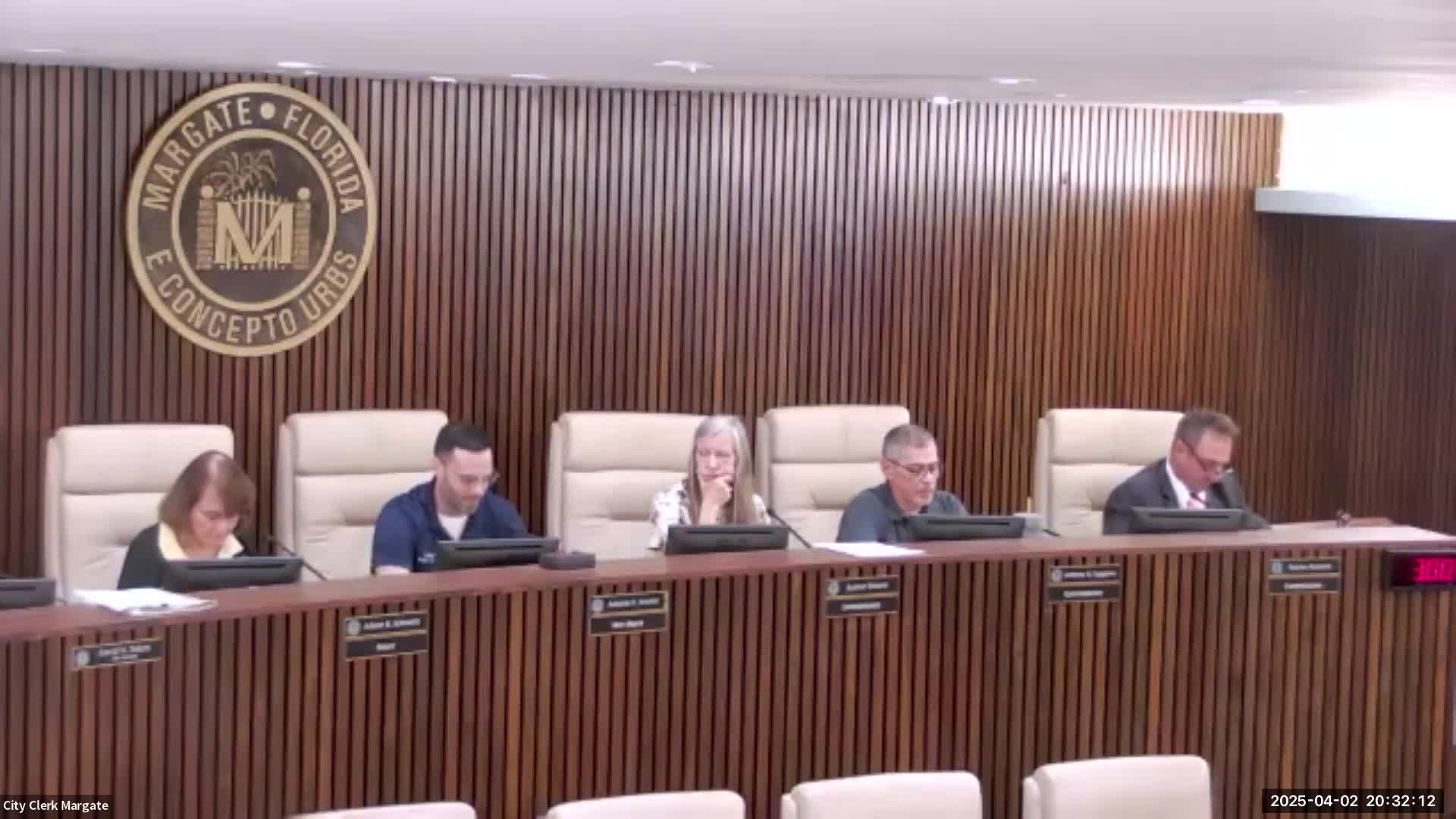Margate commissioners debate new rules for boats, RVs and work trucks, stop short of vote
Get AI-powered insights, summaries, and transcripts
Subscribe
Summary
City commissioners spent more than four hours debating a proposed amendment to Margate's parking code that would require registration of recreational and certain noncommercial vehicles and set rules for side- and back‑yard parking. The panel did not vote; staff were directed to refine options including a potential city storage/parking site.
Margate City Commissioners spent the evening debating a proposed ordinance to tighten rules on parking of recreational vehicles, boats and certain noncommercial work trucks after residents complained about vehicles parked on front lawns and curb swales.
The discussion focused on a draft amendment to Chapter 26, section 26-3, that would require registration of noncommercial recreational vehicles and establish conditions for side- and back‑yard parking, including that “the service utilized to drive said vehicle from street to the back or side yard shall be an improved surface constructed and permitted by the city of Margate Building Department.” Vice Mayor Arcerio framed the proposal as a tool to stop what he called “abuse” of the city’s permissive rules for toys and work vehicles.
Why it matters: Commissioners and residents said the visible presence of derelict or commercial vehicles and multiple cars parked on lawns lowers neighborhood appearance and property values. Commissioners differed sharply on remedies — whether to require registration, levy a nominal fee, expand driveways, strictly enforce existing codes, or create a city-run or third‑party storage/parking facility for boats and RVs.
Vice Mayor Arcerio said the draft was intended to curb misuse, not to ban owners’ recreational vehicles. “My personal feeling is you should have 1 recreational vehicle and that’s it,” he said, adding that the registration should match the homeowner or leaseholder to prevent outsiders from using Margate yards as long‑term storage.
Several commissioners urged caution. Commissioner Rosano said the city should first enforce existing rules and “start with what we have in place right now,” arguing that uneven enforcement — not just new ordinances — drives the problem. Mayor Arlene Schwartz warned against adopting rules the city cannot reasonably enforce: “Don’t pass a law you never intend to enforce,” she said, urging that enforcement capacity be considered before new penalties are added.
Debate over fees and exemptions: Some commissioners supported a modest administrative fee to cover registration costs; others strongly opposed charging residents for registering personal recreational items. Commissioner Zahn suggested allowing one vehicle or toy without a fee and charging only for additional items. Commissioners repeatedly rejected framing any solution as punitive to multigenerational and low‑income households that may legitimately need multiple vehicles.
Enforcement and staffing: Richard Nixon, director of code services, told the commission the department is reviewing workloads and said he would return in roughly two to three months with an assessment of staff capacity. Nixon noted building‑code and public‑safety concerns associated with illegal conversions that also increase on‑street parking demand.
Alternative solutions directed to staff: Rather than advance the draft ordinance as written, commissioners asked staff to develop options and return with more detail. City staff were asked to: - Research feasibility and costs of a municipally enabled off‑site parking/storage facility (ideas discussed included parcels near Lemon Tree Lake and other city‑owned land and potential use of an FPL easement), and whether the city could host or solicit a private operator to run such a facility; - Return with a refined registration proposal if warranted, including proposed fees (several commissioners repeatedly said any fee should be nominal or avoided for a first vehicle), enforcement mechanics and timeline; and - Report back on code‑enforcement capacity and whether additional temporary or contract help would be needed to implement any new program.
Public commenters pushed for immediate enforcement of current codes. Resident Richard Zucchini and others urged clearer, uniformly applied rules. George Willie, a longtime resident who said he maintains an RV on an expanded driveway, warned that lawful owners should not be penalized and asked how registration data would be stored and maintained.
Outcome and next steps: The commission did not vote on the ordinance. Rather, members directed staff to refine options and return with additional analysis and proposed language; staff also agreed to pursue the rental‑mapping vendor and other tools to help identify properties that may be contributing to parking pressure. Commissioners also asked for a future workshop on parking and code enforcement strategy.
Context: Margate’s draft mirrors debates in other South Florida communities balancing homeowners’ storage of recreational vehicles and work trucks with neighbor concerns about appearance and safety. The city’s existing code already includes restrictions on vehicles that protrude past a residence’s façade and on inoperable or abandoned vehicles; commissioners said uneven enforcement has allowed visible problems to persist.
The commission heard additional public‑comment items tonight — including resident concerns about election signs and fluoride in drinking water — but members returned repeatedly to parking as the dominant local quality‑of‑life issue. Staff will return with more options and cost estimates for council consideration.
